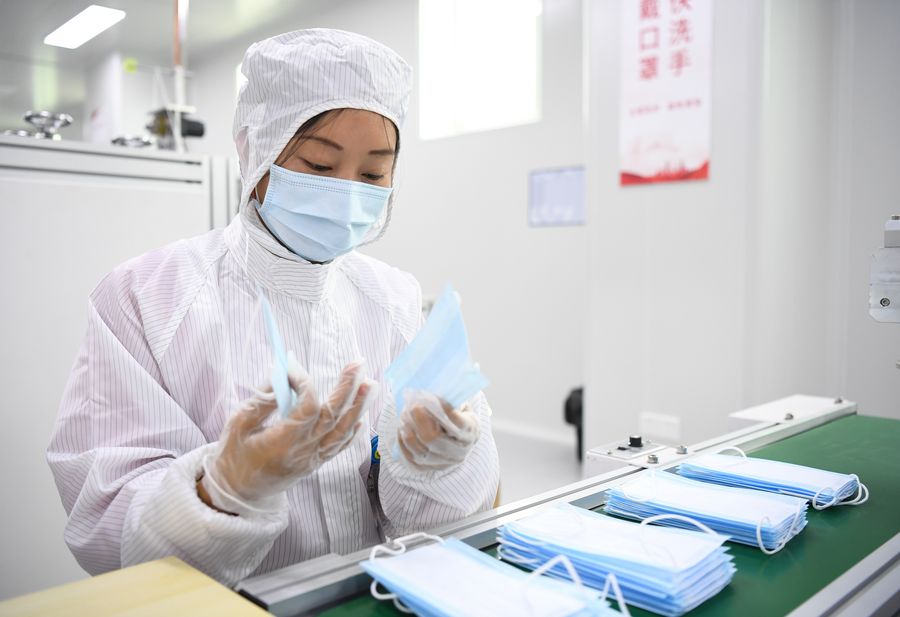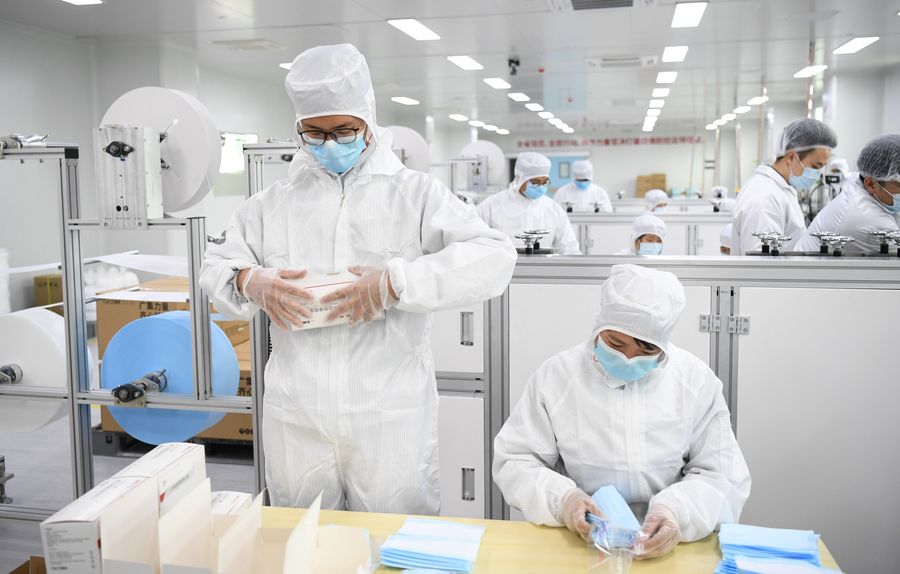China takes multi-faceted measures to moderate mask prices, ensure quality
China has provided protective masks to the global market at fair prices, by organizing as many qualified manufacturers as possible, tapping the full potential of the industrial chain and strengthening market supervision.
China has provided protective masks to the global market at fair prices, by organizing as many qualified manufacturers as possible, tapping the full potential of the industrial chain and strengthening market supervision.
The world is still scrambling to stock up on the much sought-after essentials, and Chinese authorities, regulators and manufacturers are doing what they can to moderate the prices and ensure quality.
Market feedbacks show that China's export of medical supplies is expected to maintain steady and orderly growth in the following months, offering stronger support to the global society in fighting the COVID-19 pandemic.
Containing costs
For mask manufacturers, one of their biggest challenges is to manage costs that have spiked due to soaring demand.
Cao Haoquan is chairman of the Guangzhou Weini Technology Development Co., Ltd., a supplier of masks and respirators. The firm sells 80 percent of its products to European buyers. Cao said he has never felt busier in his 20-year career.
The veteran in the medical supply business had to frequently visit his factory and inspect production quality. "The biggest challenge for me is how to curb the impact of rising costs on the prices of masks. Prices of equipment, raw materials and labor have been jumping quickly," he said.

A staff member works at the Guangzhou Weini Technology Development Co., Ltd. in Guangzhou, south China's Guangdong Province, April 22, 2020. [Photo/Xinhua]
According to Cao, the purchasing price of melt-blown non-woven fabric, a core material to make FFP2 masks, surged from 30,000 yuan (about 4,243 U.S. dollars) a tonne before the epidemic to 1.8 million yuan a tonne now.
Salaries of its frontline workers have increased by 50 percent, and the purchasing price of a mask production line also soared.
Cao said the current export price of Weini's medical masks remains relatively stable since the company has a sufficient stock of raw materials. By developing its own production equipment and building production lines of the specific fabric, the firm can hedge upstream price fluctuations.
"I never expected that I need to make the fabric myself. There is simply too much demand, and I have to do my best to level the cost," he said.
Guangzhou Jet Bio-Filtration Co., Ltd., another manufacturer of lab consumables, is also struggling with the cost increase.
"Our products are aimed at helping prevent diseases and reduce deaths," said Yuan Jianhua, chairman of the company. "Thus, we can't make a quick buck by selling overpriced products."
Many Chinese enterprises in other industries have also contributed a lot to ensuring mask production capacity by refitting their production lines.
China's leading new energy vehicle manufacturer BYD said it had achieved a daily production capacity of 20 million masks as of April 17, meeting domestic demands while exporting to overseas markets.

A staff member works on the face mask production line at the workshop of GAC Component Co., Ltd. in south China's Guangdong Province, Feb. 20, 2020. [Photo/Xinhua]
Regulating the market
Market participants attributed the capacity expansion in a short time and the stabilized prices of medical supplies to China's complete industrial chain and the effective regulatory measures taken by the government.
Sinopec Yizheng Chemical Fibre Co., Ltd., a subsidiary of China's largest oil refiner Sinopec, has put six of its 12 planned melt-blown non-woven fabric production lines into operation as of Saturday since it launched the first one on March 29.
The company has so far produced 100 tonnes of the raw material used in making 100 million medical masks.
"We will have 475 sets of equipment on our 12 production lines, provided by more than 80 suppliers. Many people are helping, and they have made this possible," said Chen Jianjun, deputy chief engineer of the company.
Meanwhile, governments at all levels in China have rolled out policies responding to enterprises' demands for employment, financing, taxation and exports, further helping them reduce costs.
The Guangdong provincial department of human resources and social security mobilized young volunteers, migrant workers and idle labor forces to fill the labor gap of local medical supplies manufacturers.
Thanks to this support, the number of mask manufacturers in Guangdong has increased from only two at the end of January to more than 600, with an overall daily output surging from fewer than 100,000 to more than 60 million masks.

Staff members work on the face mask production line at the workshop of GAC Component Co., Ltd. in south China's Guangdong Province, Feb. 20, 2020. [Photo/Xinhua]
The government has also stepped up its crackdown on market disruptions, punishing criminal activities relevant to protective items such as hoarding and price gouging, as well as manufacturing and selling fake and inferior products.
"Production of anti-epidemic supplies in China is highly market-driven," said Wan Shuping with the Department of Industry and Information Technology of Guangdong Province, noting that price supervisory authorities will follow market principles and not resort to administrative intervention. "At the same time, there's zero tolerance over illegal acts."
Stabilizing exports
China has taken measures to strengthen quality control over exports of medical supplies, with the Ministry of Commerce working with other government departments to crack down on exports of counterfeit and shoddy products and other behaviors that disrupt market and export order.
Li Xingqian, director of foreign trade department under the ministry, said the Chinese government has always been assisting the international community in various forms to stem COVID-19.
Statistics from the General Administration of Customs showed that China inspected and released a total of 21.1 billion masks from March 1 to Saturday.
As China is trying its best to meet the growing global demand for masks, the market regulator and association of the medical devices industry in Guangdong have offered training for local enterprises to better understand international trade rules and certification standards.
Huang Minju, with the Guangdong Medical Devices Quality Supervision and Test Institute, said the testing facility's workload increased significantly, with more samples for export sent to the institute by various new mask producers.
"Test data won't lie, and it will help further regulate the mask export market and ensure that China provides high-quality masks to other countries," Huang said.

